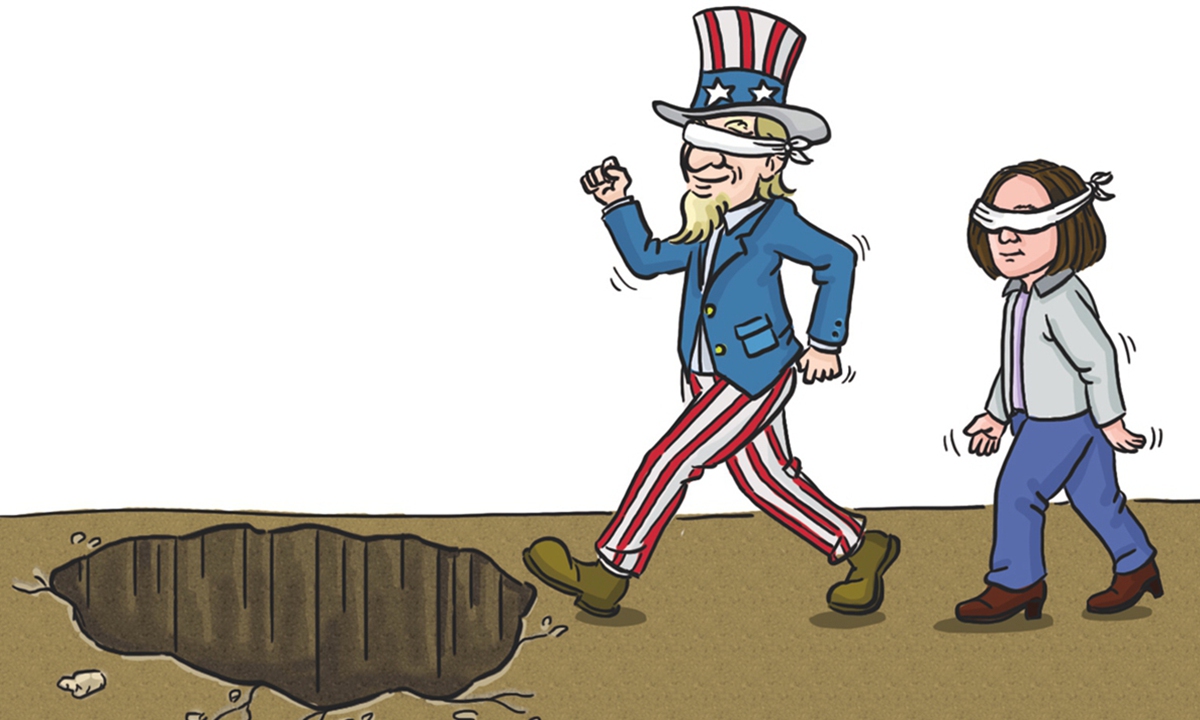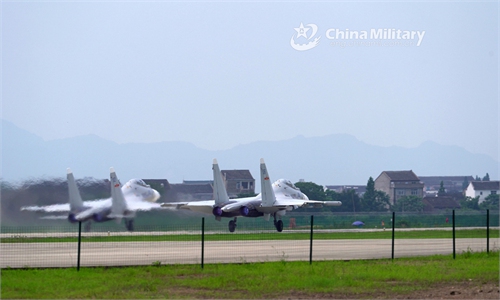
Illustration: Xia Qing/GT
The situation in the Taiwan Straits and the South China Sea is getting increasingly tense. According to data from overseas media outlets, US military planes have flied to the South China Sea 67 times in a month. The Chinese People's Liberation Army (PLA) started military exercises in the Yellow Sea on Saturday, following its just-concluded military drills in the Taiwan Straits. The PLA will also conduct military exercises in the South China Sea and the Bohai Sea on Monday. There have been increasing discussions on the risk of military conflicts.
The situation in the Taiwan Straits is the most delicate. In the South China Sea, the US is conducting unilateral military provocation, but China and other regional claimants have a clear attitude about the need to prevent military frictions. But in the Taiwan Straits, Democratic Progressive Party (DPP) authorities are making radical and active moves. Political and military issues are intertwined in the Straits, stimulating each other.
Territorial disputes in the South China Sea have been controlled properly. But Taiwan secessionism is still uncertain and could get out of control. The US strategy of containing China is the main cause of tension in the Western Pacific. The strategy has garnered limited coordination around the South China Sea, but it has won full support of DPP authorities. This makes the situation in the Taiwan Straits potentially more explosive.
There have been two extreme unstable factors in the cross-Straits situation in recent years. First, DPP authorities refuse to recognize the 1992 Consensus and have proactively promoted so-called de-sinicization. Second, the US' strategy has been to interfere in and suppress China by creating tensions in China's periphery. The two factors are more and more intertwined, seriously threatening China's national security and peace of the entire region.
Tensions in the Western Pacific region, especially in the Taiwan Straits, are in a downward spiral. There is no mutual trust between the Chinese mainland and the US or the island of Taiwan. Vigilance and hostility dominate their relations and the situation is becoming increasingly hard to control.
There is certain distance before there is a real possibility of an outbreak of war, but the risks are approaching. Relevant parties are getting prepared for the possible combat, friction points are increasing.
History shows that wars often break out not because someone wants to fight, but because parties are unable to resolve their hostilities and therefore prepared for the worst. And the worst-case scenario arrives abruptly at a certain point due to mutual misjudgments.
The Chinese mainland, the US and the island of Taiwan should all make efforts to ease tensions across the Straits. Since no one wants war, they should show their goodwill to promote peace.
The current round of change in the status quo in the Taiwan Straits stems from Taiwan regional leader Tsai Ing-wen and the DPP authorities' assuming power and their fundamental changes to Taiwan's cross-Straits policies. They shoulder the special responsibility for the ongoing tensions in the Straits.
During the era of former Taiwan leader Chen Shui-bian, the China-US relationship was much better than today. Beijing and Washington kept relatively strong communications capabilities, and Washington to some extent played a role which cooled the tensions in the Straits. Now it is the opposite. Washington has become the instigator of the radical moves of the Taiwan authorities. The US is trying to contain China by leveraging the Taiwan Straits. It is finding fault with China by hyping the Taiwan question, which reflects its overall suppression of China.
The Tsai-led authorities should call a halt right now, both tactically and strategically. If the situation around the Taiwan Straits does not cool down, military tensions will inevitably intensify, and the risk of a war may not be decided by anybody. The utilitarianism adopted by DPP authorities has almost overwhelmed everything, making them turn a blind eye to the risk of a war.
The Chinese mainland does not hope a war breaks out in the Taiwan Straits at this juncture. The bottom line of the mainland is clear and has never changed.
The current danger is that DPP authorities and the US keep ratcheting up their actions and eroding the mainland's bottom line with "salami slicing" tactics. The Taiwan authorities continually step on the bottom line under the banner of democracy, and the US constantly violates the "one-China" principle it has acknowledged in a bid to pressurize China. The two are dancing to the same tune to challenge the Chinese mainland.
Should a hot war break out, the DPP authorities will be bound to step down or even collapse. If the war turns into a comprehensive one, the DPP leaders who have committed heinous crimes will either be wiped out in the war or sent to the mainland and brought to justice. Taiwan's "defense authorities" boast their abilities and resolution in a war, which is self-deceiving. If Taiwan authorities indulge in such fantasies and push the situation into a military showdown, they will only confront these self-made tragedies in the future.

